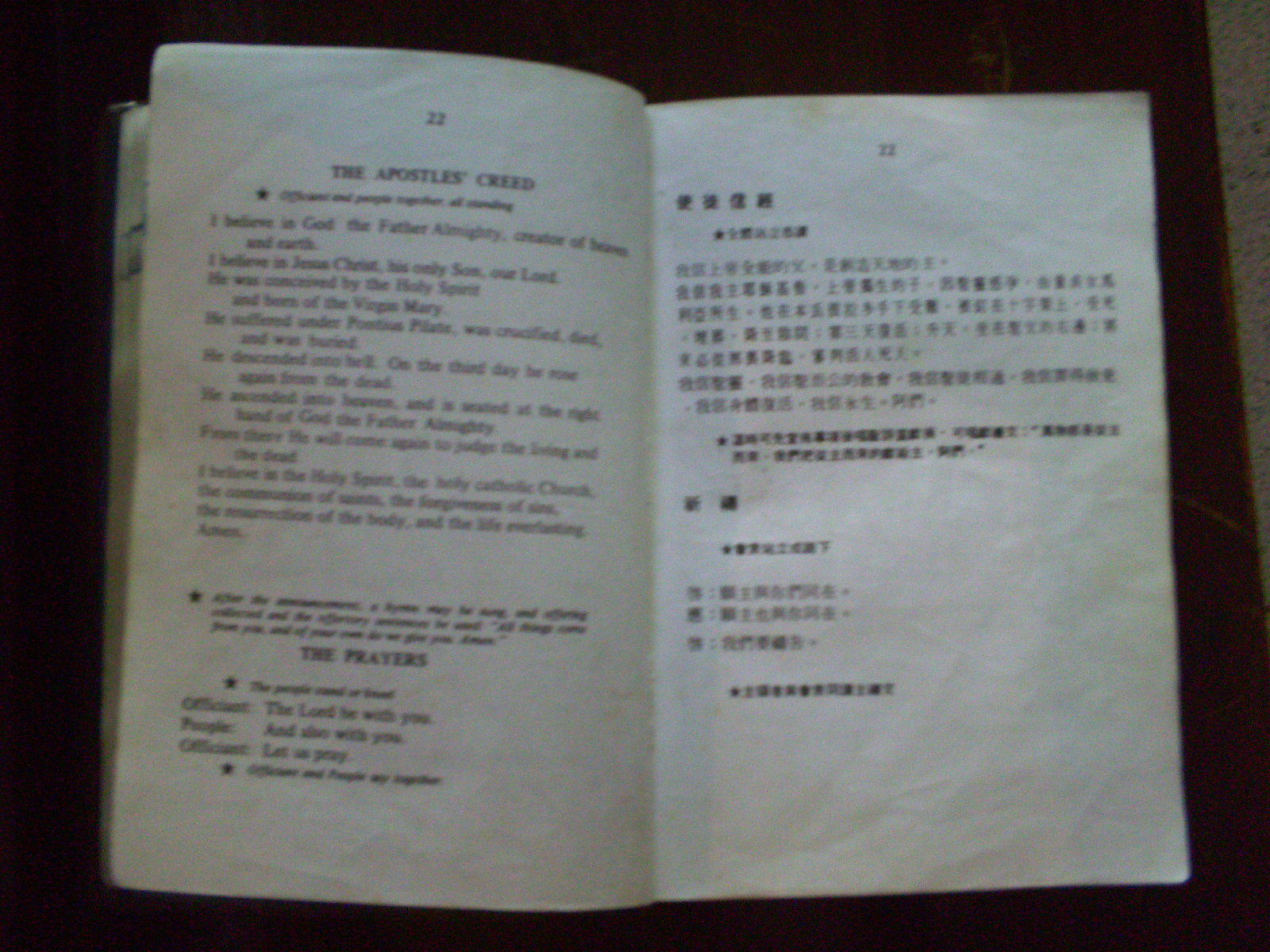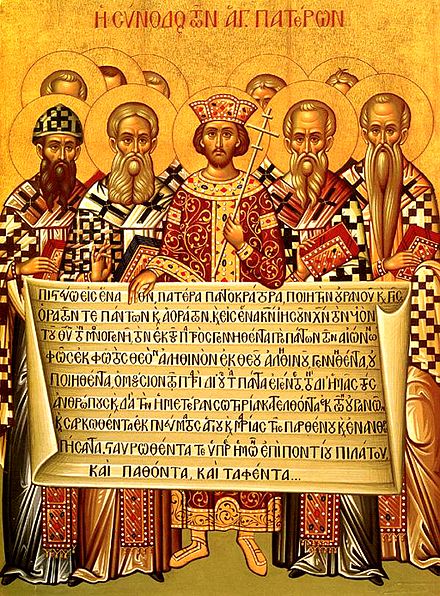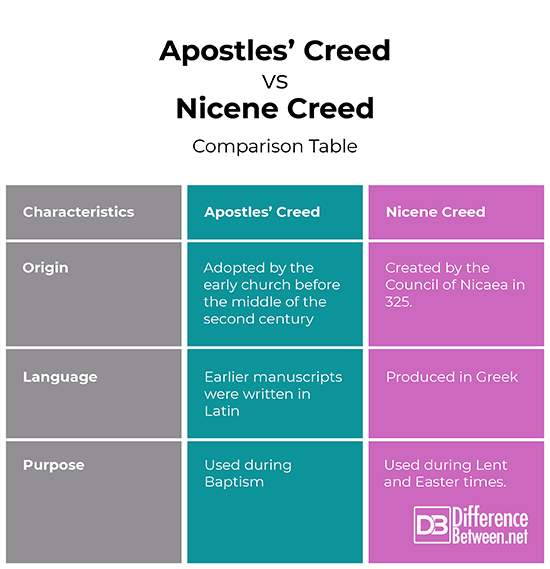Difference Between the Apostles’ Creed and the Nicene Creed
The Apostles’ and Nicene Creeds are both ancient with roots tracing back to the very beginning of the church. The church has selected, in her wisdom, the two creeds to be recited on different occasions. The decision on which creed to recite is wholly dependent on the ordained church leaders.
There exist several differences between the two creeds, however. Regardless of the two serving almost similar purposes during some religious occasions, they vary in some aspects ranging from the history to the source, as well as the wording.
If you are interested in a deeper analysis of the two, the journey should have started now. It is a detailed topic that without enough resources, it might be hard to go through. This post, however, tries to go deeper to get the variances between them.
What is ‘The Apostle’s Creed’?
The Apostle’s Creed dates back to about 400 AD. It was traditionally ascribed to Jesus Christ’s apostles even though there exists no truth that it was written by them. A deeper history of the Creed’s coming into being might shed more light on this.
The Apostle’s Creed has a widespread acceptance in the Christian church. Also called the Apostolicum, it is a statement of faith that is nowadays used by the Anglican, Roman Catholic, and many Protestant churches.
History of the Apostles’ Creed
The present text and context of the creed have similarities to the baptismal creed that was used in the church around the 3rd and 4th centuries in Rome. In the late 6th and 7th centuries, it reached its final form in the Southwest region of France.
The creed gradually replaced the existing baptismal creeds and got an acknowledgment as an official statement of faith by the entire Catholic church in the West. As of today, many Protestant churches widely accept the creed. The churches use it in worship although some, for example, the United Methodist Church deletes the line indicating that Jesus Christ, upon His death, descended to the dead.
What is ‘The Nicene Creed’?
The Nicene Creed is a widely used statement of belief, commonly associated with Christian liturgy. The term ‘Nicene’ was adopted as the creed was originally adopted in the city called Nicaea in Turkey. It is the present day Iznik.
History of the Nicene Creed
The creed was adopted mainly to resolve what is known as the Arian controversy. The controversy, led by one clergyman of Alexandria, Arius, objected Alexander’s, the bishop of the time, apparent carelessness to blur the distinction existing between the nature of God the Father and the Son.
When the controversy arose, Alexander accused Arius of openly denying the divinity of God the Son. He also accused him of being too “Greek” and “Jewish” in his thoughts. It was after this that Alexander and his supporters went ahead to craft the Nicene Creed to bring out clarity in the key tenets of the Christian faith. This was in response to the widespread adoption of Arian’s doctrines. The doctrines were henceforth marked as heresy.
Forms of the Nicene Creed
The Nicene Creed takes different forms with the variances based on the wording.
The Assyrian and Oriental Orthodox churches use the profession of faith with a variation in the pronoun and verbs in the plural. That is, “we believe”. The Catholic and Eastern Orthodox churches, on the other hand, convert the noun and verb to singularity and use “I believe” instead. Also, the Anglican church and many other Protestant denominations use the singular form and sometimes the plural.
Similarities Between the Apostles’ and Nicene Creeds
The two creeds have some similarities:
- They are both statements of a belief.
- Both are crafted with the Latin word “creed” which means “I Believe”.
- Both creeds are used to pray as well as connect with God.
Differences Between the Apostles’ and Nicene Creed
-
Origin
The Apostles’ Creed is referred to as so as it is rightly regarded as a faithful summary of the Apostles’ faith. It is also regarded as the ancient baptismal symbol, and thus, its great authority arises from that fact. On the other hand, the Nicene Creed draws its authority from the reason that it stemmed from the first two ecumenical councils.
-
History
The Apostles’ Creed is the oldest of the two as it was drawn up and adopted by the early church before the middle of the 2nd century. The Nicene Creed was created in 325 by the Council of Nicaea.
-
Purpose
The Apostles’ Creed has been in use during Baptism while the Nicene Creed is mostly associated with the death of Jesus Christ. As such, it is recited during Lent and Easter times.
-
Wording
The wording in both creeds differs too.
- The Apostle’s Creed begins with “I Believe” while the Nicene Creed uses “We Believe”.
- The wording “descended into hell” is recited in the Apostles’ Creed but is absent in the Nicene Creed.
-
Language
The Apostles’ Creed has an origins in the Greek language although the earliest manuscripts are in Latin while the Nicene Creed was produced in Greek.
Apostles’ Creed Vs. Nicene Creed: Comparison Table
Summary of Apostles’ Creed Vs. Nicene Creed
Even though the two creeds have variances, they roughly serve the same purposes. They are widely accepted as statements professing a belief by Christians. The main purpose as to why they were both developed was to address different problems which brings about the different wording.
- Difference Between Minecraft and Terraria - August 7, 2020
- Difference Between Alliteration and Onomatopoeia Poems - July 25, 2019
- Difference Between Certification and Licensure - July 24, 2019
Search DifferenceBetween.net :
26 Comments
Leave a Response
References :
[0]Image credit: https://en.wikipedia.org/wiki/Nicene_Creed#/media/File:Nicaea_icon.jpg
[1]Image credit: https://en.wikipedia.org/wiki/File:The_Apostles%27_Creed_in_a_Chinese_Book_of_Common_Prayer.jpg
[2]Wilburn, Rev. "Difference Between The Apostles’ And Nicene Creeds | Lakeland Community". Lakelandcommunity.Org, 2018, http://www.lakelandcommunity.org/2016/04/ryan-fouts-on-the-difference-between-the-apostles-and-nicene-creeds/. Accessed 14 Nov 2018.
[3]Kosloski, Philip. "What’S The Difference Between The Apostles’ Creed And Nicene Creed?". Aleteia — Catholic Spirituality, Lifestyle, World News, And Culture, 2018, https://aleteia.org/2018/02/01/whats-the-difference-between-the-apostles-creed-and-nicene-creed/. Accessed 14 Nov 2018.
[4]Nicene Creed & Apostles' Creed Compare. 2018, https://sbcgjg15.weebly.com/nicene-creed--apostles-creed-compare.html. Accessed 14 Nov 2018.




Very detailed and deep rooted piece of work, I’m now more enlightened.
very good
Honestly I didn’t the differences till today
Thank you for the clarification, More learnings will bring us to God.
Very educative. But I want the full text of the two creeds delivered to my in box please.
Marvelous call to The Way ‘from within’,
to among.
What a marvelous way of spreading the Truth to others! Brother Anthony, OFS (3/1/2020)
The new church baptized in Jesus name only or in the name of the Lord Jesus In the Bible clearly stated and asked that they stayed steadfast and apostles doctrine I would like to learn more about that the church the Catholic Church I want to change the doctor and from Jesus name the father son Holy Ghost
Hi Gary your comment on the early church baptizing in the name of Jesus is correct. There are churches that still baptize in the Lord’s name. Many Pentecostal churches baptize in his name. If you start with Matthew the 28th chapter vs 19 through v 20.
Jesus instructs the Apostles to baptize in the name of the Father Son and of the Holy Ghost.
Let me help you on this verse. The titles of Father Son and of the Holy Ghost are just that. They are titles and not names. Jesus instructed them on this order because He had not yet been crucified, died,risen and ascended. If you look at each title you can easily see who he was talking about.
Who and what is the name of the Father? His name is Jesus. Who and what is the name of the Son? His name is Jesus. Now who and what is the name of the Holy Spirit? His name is Jesus.
Therefore Jesus was instructing them that when you baptize you do it in His name. Now if you believe that Jesus is God in bodly/human form then you know that this covers the one true God who’s name is Jesus.(Colossians 2v9)
If you remember the story in Matthew chapter 9 v 14-15. I know that this is speaking about fasting but the answer will relate to the baptism. While the bridegroom is alive there was no baptism until His death and resurrection. We know that John baptised but not in any name because John was baptizing the people unto repentance. He was preparing the people for the Christ the anointed one.
Now go to Acts 2v38. The Holy Ghost which was promise by Jesus, has fallen and here Peter explains what has happen and what they should do.
V38 Repent, be baptized every one of you in the name of Jesus Christ for the remission.of sins,and you shall receive the gift of the Holy Ghost. On that day 3000 souls were baptized in Jesus name and filled with his spirit.
From that time on the Apostles baptized in the name of Jesus. If your father’s last name is Broom then you have the identity.of your father as a Broom. You did not take on the identity of Mr. Jones because your father is a Broom and if you have any sibling that belong to your father they are Brooms as well.
The baptism in Jesus name is the commencement by Jesus for the New Covenant church. On the day of Pentecost they were all waiting on the the power of the spirit of the Holy Ghost which is the spirit of Jesus Christ. If you believe that Jesus is you father and that he is the Son that He rose and died for you then you must take.on His name, owenership.
As a last note we see that Peter commanded thosee in the house of Corelius be baptized in the name of the Lord Jesus Christ (Acts 10 v48)after receiving the gift of the Holy Ghost. Making Cornelius and his household the first Gentiles to receive the spirit of the Lord.
I understand that in the 2nd Century the Catholic church changed their baptism formulary but the Bible did not change.look at Acts 4:12 and Colossians 3:17.
I am not trying to preach to you but I hope this little nugget will open up your understanding and provoke you to meditate over the name of Jesus. As you do so with sincerity ask God to sen you the revelation. Only He can do that. I pray The Lord Jesus bless you through His word.
This comment was truly helpful to me as I have always been a believer in Christ Jesus but never really knew him like I have in the past 2 years of my life and I continue to learn so much, I was researching the Apostles/Nicene Creed and have been so conflicted with the word AGAIN where it reads “he suffered,died, and was buried, on the third day he rose AGAIN? Why AGAIN? did he not only die once? So when before this did he rise? Please forgive my ignorance as I only wish to have clarity, could you possibly help me better understand? I see it in all the Creeds that I look up. I know that I have seen changes in my own Bible that I can not explain so I wanted to make sure the word “Again” is infact Just, I would greatly appreciate your help.
Dear Karlyn Johnson, Jesus instructs the Apostles to Baptise for the name of the Father, of the Son and of the Holy Spirit (Matthew 28:19 in the orihinsl Hebrew Bible). Your comments are quite confusing. Please advise taking into consideration Acts 8:16.
You can get a clear answer from the messages of William Marian Brenham who is a true prophet of our Lord. God bless you.
Sarah,
Thank you for your work. I grew up in the Roman Catholic church , however I have been a member of the Eastern Orthodox church over the last 5 years .
I found your article to be enlightening. I would like to share a couple of items. The Nicene creed is recited at every Divine Liturgy (Orthodox eucharistic service) , as well as a part of daily prayers. It is a one page expression of faith which pretty much sums up the Orthodox faith. There are actually 2 versions of the creed in common usage. The original version created by the first 2 ecumenical councils was in response to the teachings of Arius, a bishop who espoused the idea that Christ was not fully God and that he was the highest of created beings. Later, again in response to Arianism in Spain, the phrase “and the Son” was added to the creed regarding the origin of the Holy Spirit. Initially opposed in the west, this addition eventually found its way into the creed in the west and became the official version of the Roman Catholic church. In the east it was regarded as heterodoxical /heretical , and the Eastern Orthodox have stood by the original version produced by the first 2 councils. After the great schism of 1054, these differences marked a significant distinction between the 2 churches, along with papal infallibility and the concept of original sin.
Thank you for your excellent work and sharing.
David Fortenberry
Sarah,
I should have added the addition of “and the Son” is referred to as the filioque. I am sure you are well aware of that but some readers may not be.
Thanks,
David
Addendum #2
The first council of Nicea was called by emperor Constantine in order to resolve the issue of Arianism.
Thanks,
David
The father the son and the holy spirit, the trinity is what Christian’s believe. The holiest time of year. Live good like Jesus help others to understand the world is evil. Chose God and not worldly things. God knows his,and is coming to claim them. Coronavirus is the first of many warnings Revealations book is open. Where will you be.
The both creeds prove the trinitarian principles. Also the position of the church and the blessed virgin Mary
Hi this part was not clear (who did what):
History of the Nicene Creed
The creed was adopted mainly to resolve what is known as the Arian controversy. The controversy, led by one clergyman of Alexandria, Arius, objected Alexander’s, the bishop of the time, apparent carelessness to blur the distinction existing between the nature of God the Father and the Son.
When the controversy arose, Alexander accused Arius of openly denying the divinity of God the Son. He also accused him of being too “Greek” and “Jewish” in his thoughts. It was after this that Alexander and his supporters went ahead to craft the Nicene Creed to bring out clarity in the key tenets of the Christian faith. This was in response to the widespread adoption of Arian’s doctrines. The doctrines were henceforth marked as heresy.
Very nice helped with my assignment
Can anyone explain the theology behind the sentence in the Apostles Creed, “He descended into hell”. This doesn’t appear in the Nicene Creed and I find it a difficult concept to understand- that God should spend any time in hell??!!
To take our first ancestors Adam and Eve out of the hell.
I grew up in a presbyterian church as a kid we were taught the apostles creed and recited every Sunday. I went back again in my 60’s and found they had added the wording ” descended into hell” and I could not go back. I would like to know who was responsible for adding this as it is a sin to add any words to the bible, especially as it does not say that anywhere in the bible.
The creeds are not scripture. They are fashioned by men. The early church after the apostles was full of anti Semitic bias. The teaching of the trinity was an attempt to separate and distinguish Christians from Jews.
Be a Berean and prove yourself a student of your bible.
In the “what is” section, the Apostles’ Creed is described as dating back to 400 AD. Later, it is dated between the 2nd and 3rd century, prior to the Council of Nicaea. Can you clarify? Thanks
Sadly, people know it only byheart and doesn’t literally mean it. The order of worship should be erased from the beliefs from protestant churches and allow the Holy Spirit God to manifest and take control of the churches. Hebrew 6:1 says not the lay the elementary teachings as foundation and people are so blinded and repeat the creeds every Sunday. People are so well versed with the creeds there is a competition as to who finishes it quickly and says Amen. May the veil be removed sooner from these people who are stuck in their beliefs and superstitions and refer only the Holy Bible and not any man made creeds.
I was taught that Jesus “descended into Hell” between the time of his death and resurrection, in order to give those in Hell a chance to repent so he could forgive them and allow them into Heaven.